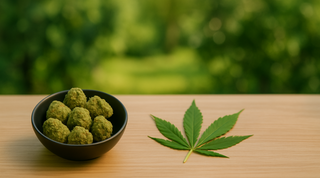
Introduction
“CBD, THCa… aren’t they both non-psychoactive?”
That’s true—but they’re definitely not the same. As hemp wellness takes over the spotlight, more people are exploring cannabinoids like THCa and CBD—but the differences still confuse even seasoned users. In this guide, we’ll break down what makes THCa different from CBD, what they have in common, and how to choose the right one for your health goals. Whether you’re team CBD, team THCa, or just cannabinoid-curious—we’ve got you.
What Is THCa?
THCa (tetrahydrocannabinolic acid) is the raw, unheated form of THC. It’s found in live cannabis and hemp plants and is completely non-psychoactive—until you heat it. That process, called decarboxylation, converts THCa into THC (yep, the stuff that gets you high).
But if you keep it raw—like in juices, capsules, or tinctures—THCa may support your wellness in other powerful ways. Many users turn to it for its anti-inflammatory properties, neuroprotective potential, and help with nausea and joint pain. It’s gaining traction as a go-to for people who want therapeutic benefits without the high.

What Is CBD?
CBD (cannabidiol) is one of the most well-known and widely researched cannabinoids out there. It’s non-psychoactive and doesn’t convert into THC, no matter how you consume it.
Extracted primarily from hemp plants, CBD is loved for its ability to promote calm, balance, and relief. People commonly use it for anxiety, sleep support, chronic pain, and stress management. From oils to gummies to skincare—CBD is the versatile MVP of the cannabinoid world.
Is THCa the Same as CBD? Here's the Key Difference
Let’s break it down simply: THCa and CBD are chemically and functionally different.
- THCa is the acidic precursor to THC. It’s non-psychoactive until you heat it.
- CBD is a standalone cannabinoid that doesn’t convert and stays non-psychoactive in every form.
They also interact with your body differently. THCa works through pathways related to inflammation and cellular health, while CBD engages with your endocannabinoid system to promote balance and ease. One might help with nausea and neuroprotection, the other with mood, anxiety, and rest. Two cannabinoids, two different missions.

THCa vs CBD: Effects and Use Cases
So, what can these cannabinoids actually do?
THCa
- Anti-inflammatory
- May aid neuroprotection
- Useful for nausea and joint pain
- Best consumed raw (tinctures, juices, capsules)
CBD
- Calms the nervous system
- Supports sleep and relaxation
- Eases anxiety and stress
- Versatile: oils, gummies, topicals, you name it
Both are non-intoxicating and safe for daily use, but their effects vary—THCa for the physical body, CBD for mental balance.
Can You Take THCa and CBD Together?
Yes—and many people do! Combining cannabinoids can lead to the entourage effect, where they work better together than alone.
Think of it like a wellness power duo:
Together, they support your mind and body. You’ll often find full-spectrum products that naturally include both—or you can blend tinctures for your own custom effect. It’s a choose-your-own-cannabinoid-adventure.

Which One Should You Choose?
Go with THCa if:
- You want the benefits of raw cannabis without any high
- You’re focused on inflammation, nausea, or neurological support
Stick with CBD if:
- You want to feel calmer, sleep better, or ease everyday stress
- You’re looking for a cannabinoid with tons of products and studies behind it
Or try both. You might find that the combination gives you more complete, balanced results. It all depends on your goals and how your body responds.
Conclusion
So, is THCa the same as CBD? Not quite. While both are non-psychoactive and derived from hemp, they have different roles in your body and offer unique benefits.
Understanding these differences empowers you to build a smarter wellness routine—one that’s tailored, intentional, and plant-powered. At hhemp.co, we make cannabinoid education simple, science-backed, and accessible—so you can feel confident with every drop, puff, or capsule.



